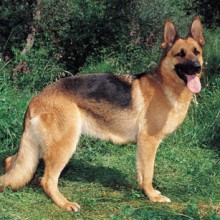German Shepherd Dog
Lifestyle Needs

The German Shepherd Dog is a large, strong animal often used for guarding or police work. The GSD can be a good family dog if trained properly but needs experienced handling. He relishes training and needs a firm and consistent hand. Some GSDs have a very high working drive and should be avoided when choosing a family pet. Aggression due to fearfulness has also been reported in the breed, therefore great care needs to be taken to ensure sound temperament. The GSD has a thick double coat which sheds fur, so should be groomed at least twice a week. He needs more than two hours exercise every day. Average life-span 10.3 years.
Genetic Diversity
(Known as Coefficient of Inbreeding: 'COI'. It should be as low as possible.)
The UK Kennel Club breed average COI is 3.4% - See 'A Beginners Guide to COI'
Gene Pool Size
(Known as Effective Population Size: 'EPS')
147.5
EPS is a measure of how many individuals are contributing genetically to a breed population. It is a measure of the size of the gene pool in a breed. Lower than 100 is considered critical by conservationists and below 50 brings a breed close to extinction. For more information see the Kennel Club article.
Health and Welfare Problems due to Conformation
(Body shape and physical characteristics)
- The show type GSD sometimes has a steeply sloping back and very angulated hind quarters. This may lead to orthopaedic complications.
- The more old fashioned type (previously known as the Alsatian) is more natural looking and somewhat heavier. The modern working GSD is super athletic dog but because of his high working drive, probably would not make a suitable pet dog. Bear this in mind when choosing your breeder and puppy.
- Gastric dilatation volvulus (GDV) (Torsion / Bloat)
BVA/KC Health Schemes: www.bva.co.uk/chs
- Hip dysplasia: breed 5 year mean score 14.5 (parents should be lower)
- Elbow dysplasia: ideally 0:0
- Eye disease: Hereditary cataract (HC) (annual testing); Progressive retinal atrophy (PRA) (annual testing); Multi-focal retinal dysplasia (MRD) (litter screening); Primary lens luxation (PLL)
- The GSD is one of the 14 high profile breeds designated by the Kennel Club as requiring particular monitoring by reason of visible conditions which may cause health and welfare concerns.
Identified by the UK Kennel Club as part of their Breed Health and Conservation Plan.
Estimated Breeding Values (EBVs) : EBVs for Hip and Elbow Dysplasia are available for this breed
www.thekennelclub.org.uk/about-ebvs
DNA Tests Available
DogWellNet and IPFD Harmonisation of Genetic Testing for Dogs (HGTD)
www.dogwellnet.com/breeds
- Degenerative myelopathy (DM/CDRM)
- Haemophilia FV111D
- Multi Drug Resistance (MDR1)
- Pituitary dwarfism
Availability of a DNA test does not mean that it is always necessary or even desirable for breeders to use this test.
Other Breed-Specific Health Screening Schemes
- Bitches under 2 years not to produce a litter
- No stud dog to be used under 18 months of age
Ask the breeder to show you the certificates for the above tests/screening for both parents. If any of the above tests have not been considered necessary by the breeder (and there may be good reasons), ask her to explain why.
Other Diseases Reported
(For which there are currently no genetic or screening tests for sire or dam)
- Patent ductus arteriosis
- Anal furunculosis
- Allergic skin disease
- Bloat/GDV (gastric dilation and volvulus)
- Cancer
- Lumbo-sacral stenosis
- Epilepsy
- Diarrhoea
- Panosteitis
Ask the breeder about the medical history of the parents, grandparents and great grandparents. Consider carefully whether to purchase a puppy if some of these or other diseases are in the family line.
Ask about the breeder’s policy in cases of serious genetic diseases occurring to your puppy in later life. Good breeders will request to be informed of such events in order to improve future breeding decisions.
You are strongly advised to buy from a breeder who uses (or is prepared to use) the AWF Puppy Contract and Puppy Information Pack (PIP): www.puppycontract.org.uk
The breeder should also be familiar with the CFSG/DBRG Code of Practice for Dog Breeding